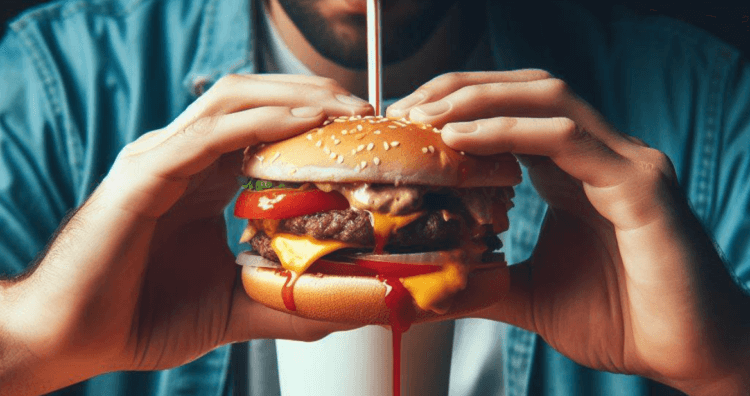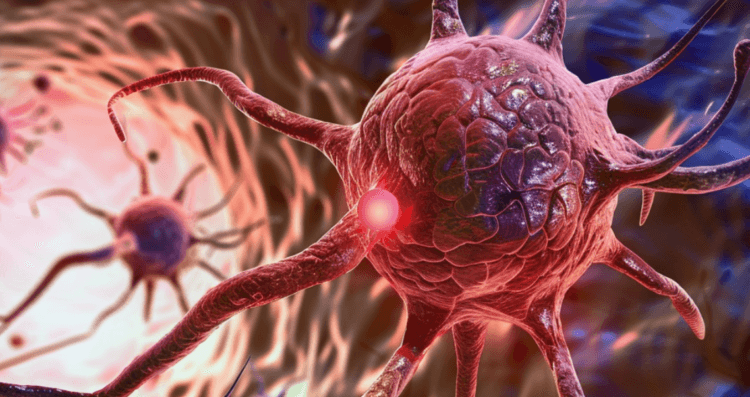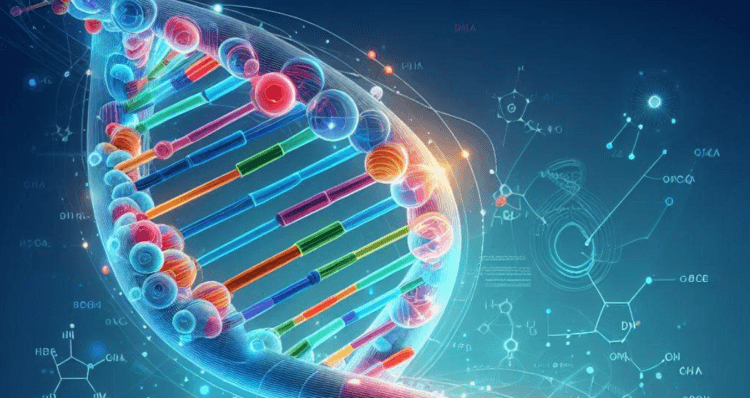Oncological diseases are known to arise for various reasons – as a result of radiation exposure, genetic predisposition, smoking, consumption of foods containing carcinogens, and poor nutrition. The latter leads to obesity and other chronic diseases, including diabetes. But why is the risk of cancer associated with poor diet, even if it does not contain carcinogens? Until recently, science did not have an exact answer to this question. It was possible to shed light on the relationship between diet and cancer only thanks to a recent study by scientists from the UK and Singapore.

Unhealthy diet increases the risk of cancer, even if it does not contain carcinogens
How cancer is linked to diet
Poor nutrition involves consuming large amounts of high-calorie foods, especially saturated fats, trans fats, easily digestible carbohydrates, etc. Together with a sedentary lifestyle, such a diet causes obesity and elevated blood glucose levels, which causes the development of other diseases, including diabetes and even cancer.
In a recent study, scientists set out to find out exactly how changes in glucose metabolism may contribute to the growth of malignant cells. To do this, they used mice, human tissue, and human mammary organoids. Let us recall that organoids are artificially grown clusters of cells of a particular organ obtained from stem cells. We talked more about organoids in the article dedicated to the organoid of the brain with schizophrenia.
In their study, scientists found that an increased risk of cancer is associated with a temporary shutdown of the BRCA2 genes, which provide protection to the body from cancer. Once the genes stop functioning, the DNA begins to mutate, which ultimately leads to the appearance of malignant cells.

Improper nutrition leads to a surge in blood glucose, resulting in the switching off of genes that protect DNA from mutations
< p>Scientists have also discovered that the risk of developing various types of cancer occurs even when only one of the two cellular BRCA2 genes stops working. But if a mutation occurs in only one of the BRCA2 genes in mouse or human cells, there is no sign of genetic instability. That is, simply put, DNA does not mutate. Why then does the risk of cancer increase?
As it turned out, cells with this mutation were more vulnerable to environmental toxins, such as formaldehyde or acetaldehyde. This leads to even greater suppression of BRCA2, and as a result, the development of cancer.
Why poor diet causes cancer
To find out why elevated glucose levels affect an important gene that protects against cancer, scientists studied people who had inherited one defective copy of BRCA2. As it turned out, the cells of such people were more sensitive to methylglyoxal (MGO). This compound is produced when glucose is broken down by cells in the process of glycolysis, that is, energy is extracted from it.

Due to improper nutrition, mutations accumulate in cells that cause cancer
As a result of glycolysis, more than 90% of all MGO in cells is generated. However, this connection is maintained at a minimal level by a pair of enzymes. If the enzymes fail to do their job, MGO levels rise, resulting in toxic compounds that damage DNA and proteins in cells.
The researchers also found that MGO temporarily disables the tumor suppressive function of BRCA2. The authors observed this effect in both non-cancerous cells and tissue samples from people with breast cancer, as well as in tissue from mice with pancreatic cancer. This was reported in the journal Cell.
Because the BRCA2 gene is not permanently inactivated, the proteins it produces can return to normal levels. However, cells that are frequently exposed to MGO accumulate mutations whenever the BRCA2 gene stops functioning. As you know, cancer usually occurs precisely due to cell mutations, however, it is already known that sometimes tumors arise without mutations, but in this case we are not talking about that.

High glucose levels actually cause DNA damage
Since MGO can temporarily stop the BRCA2 protein from repairing DNA, Poor diet increases the risk of cancer even in people who have two functional copies of this gene. Additionally, the study found that elevated MGO levels cause diabetes complications. However, this compound is easy to monitor with tests and can be reduced with medications if necessary. True, in order to use the acquired knowledge in practice, scientists must conduct a number of additional studies.
Do not forget to subscribe to our Zen and Telegram channels so as not to miss the most interesting and incredible scientific discoveries!
However, conclusions can be drawn now – bring your diet back to normal and exercise more. This will avoid excessive increases in blood glucose levels, which is the source of MGO in cells.